Our sleep time accounts for one-third of human life, which is to say that one-third of human life is spent in bed. And the quality of the bed directly affects people's working status and quality of life. With the continuous improvement of people's requirements, the humanized and intelligent design of the bed is greatly important. Electric beds with multiple functions such as detection, massage, and adjustment, can not only meet people's demand for comfort, but also meet the demand for safe, healthy and scientific sleep, which have received extensive attention from the market.
Based on the traditional fixed bed, the electric bed combines high-tech technology covering many features, including intelligent adjustment, intelligent monitoring and intervention, intelligent sleep data service, intelligent experience, with environmental protection and safety design concepts, which can better reflect humanized care.
The US Market for Electric Beds Is in the Ascendant, And the Chinese Market Is Gradually Developing
Electric beds originated in Europe and America, the main consumer markets. In 2019, the penetration rate of electric beds in the United States, where the electric bed market is growing fastest in the world, was 14.50% in the overall bedding product. The sales without factory direct sales in the US exceeded 1 million in 2016, in which the compound annual growth rate was 20.3% from 2013 to 2017. Looking back at the development of the electric bed industry in the US over the past 15 years, it was initially aimed at the elderly, but now the mainstream consumer groups are between 30-40 years old.
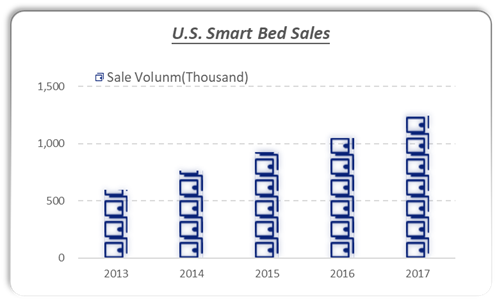
Electric bed market in China is still in its infancy, introduced at the beginning of the 21st century. Although the domestic development was late, it developed rapidly. Data shows that the demand for electric beds in China has increased from 366,600 in 2014 to 900,800 in 2019. The market size of domestic electric beds was 1.934 billion yuan, a year-on-year increase of 19.84%, yet not as good as the sales volume in the US in 2016, but with a higher compound growth rate of 24.05% from 2014 to 2019, which can be seen that the domestic electric bed has a small initial scale, but has developed rapidly.
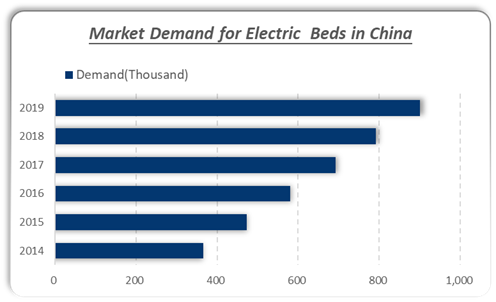
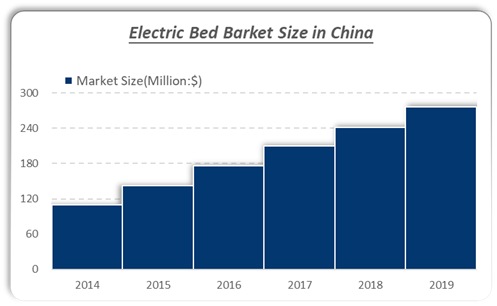
With the increase in the urbanization rate and the disposable income of residents, consumption upgrades promote the demand for electric beds. In 2018, China's urbanization rate reached 59.58%, which is estimated that by 2050, China's urbanization rate will reach 80% of developed countries in Europe and America.
With the increase in disposable income and the gradual increase in consumption power, the consumption structure and consumption philosophy of residents have also undergone certain changes. The factors affecting residents' consumption behavior have gradually developed from price to brand, quality, reputation, service, and shopping environment When choosing furniture, they will prefer high-tech products to improve the quality of life, which has laid a good foundation for the rapid development of the electric furniture industry.
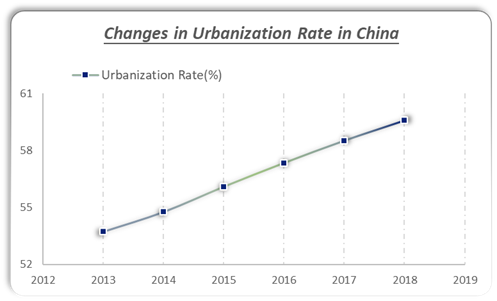
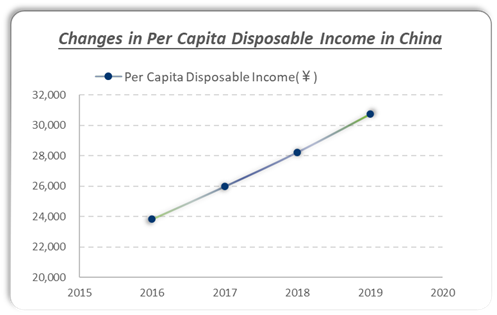
China has entered an aging society around 2005. In 2018, the population over 60 years old in China accounted for 17.90%, and the population over 65 years old accounted for 11.19%, accelerating its aging. Relevant data predict that China's elderly population will account for more than a quarter of the total population around 2035.
Aging Population Brings Development Opportunities
According to the survey data, there are 31.6 elderly care beds for every thousand elderly people. According to the requirement of the State Council, the elderly health management rate has reached 70%, and nursing beds account for no less than 30% of the local elderly care beds. It is estimated that the demand for electric beds for the elderly in the past three years is 100,000, and the market space is 450 million yuan at a price of 660 US dollars. Even taking into account the proliferation of non-elderly care needs, the development of domestic electric nursing beds is still in the early stage of development and the scale is limited.
Electric beds can not only provide electric home services for the elderly, but also quickly monitor and record the health data, which has inherent advantages in the elderly care market. With the gradual development and growth of the elderly care market, the electric bed industry has a bright future in the elderly care market.
The US Market for Electric Beds Is Highly Concentrated, And the Market in China Needs to Be Further Improved
The U.S. electric bed industry has a high degree of concentration, in which the top two manufacturers have a market share of 73%, mainly Leggett and Keeson Technology. Leggett is an American company with a market share of 27%. Keeson Technology is a major domestic electric bed manufacturer with a market share of 36% of the total market in the US and a production capacity of 1.17 million.
China is dominated by small and medium-sized intelligent electric bed manufacturers with a high degree of concentration. Domestic electric beds are still in their infancy, and there are fewer companies that produce electric beds as their main business, so the degree of concentration is high. In addition to Keeson Technology in China, there are other four companies in China, such as Ruffino and Amazon, in which the top five companies that produce electric beds have a market share of 45%, not as high as that of the US. As the domestic electric bed industry has just started, the market structure has taken shape initially, which is expected to be further optimized, and manufacturers with high-quality products and resources have the opportunity to reverse the situation.
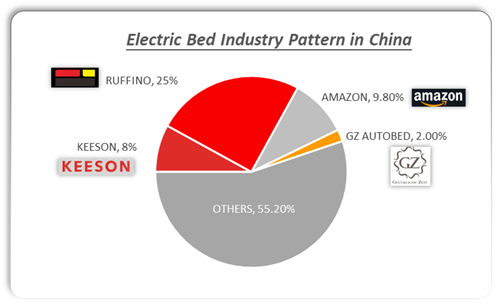
Kesson is one of the first domestic companies engaged in the research and development, design, production, and sales of smart electric beds, also the largest supplier of smart electric beds in the US. The products are mainly exported to the United States, Canada, Australia, Russia, and Japan, Kesson has not only occupied the foreign market, but also cultivated the domestic market. As the domestic demand for smart electric beds continues to increase, the domestic brand, D-Superieur of Kesson, has benefited from it, expected to reverse the domestic market structure.
Custom Reporting
https://www.globalmarketmonitor.com/request.php?type=9&rid=0
We provide more professional and intelligent market reports to complement your business decisions.